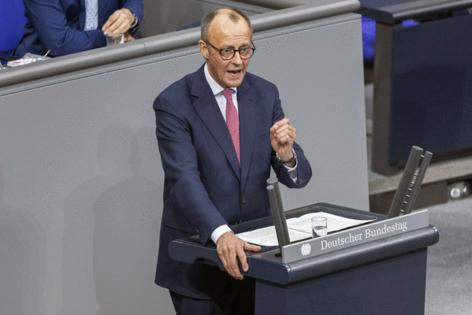German conservatives seal election win, seeking coalition talks
Published in News & Features
Germany’s conservative opposition leader Friedrich Merz said he’ll move quickly to form a new government after he won Sunday’s federal election with a result that will require him to form a coalition.
Merz’s CDU/CSU bloc won 28.8% of the votes, followed by 20.2% for the far-right Alternative for Germany, according to estimates from public broadcaster ARD. Chancellor Olaf Scholz’s Social Democrats finished third with 16.2%, the party’s worst result since World War II.
The election comes at a delicate moment as Europe’s biggest economy contends with stagnating growth, Russia’s war in Ukraine and U.S. President Donald Trump threatening a global trade war that could hobble Germany’s struggling industrial sector. European Union leaders will meet next week to discuss the bloc’s precarious defense situation.
“There’s no reasonable alternative to forming a government in Germany in a reasonable and timely manner,” Merz said in a debate Sunday night, adding that he wanted to form a coalition within the next two months. “The world isn’t waiting for us — Europe is waiting for Germany, that we take a stronger leadership role again.”
The euro opened slightly stronger in Asia morning trading, up 0.3% to $1.0487. With exit polls broadly in line with what was expected by markets, investors’ attention will now turn to how quickly Merz can form a government.
Merz’s center-right CDU/CSU alliance will need at least one coalition partner to secure a majority in the lower house of parliament. His most likely alliance options are either the SPD — almost certainly without any cabinet role for Scholz — or the Greens. Depending on the final makeup of parliament, Merz may need both in an unwieldy three-party coalition.
The biggest potential points of friction between the CDU and SPD will likely be over social welfare spending, migration and expected state financing to fund massive outlays to bolster the defense sector.
If only five parties qualify to enter parliament and the current projections stand, the CDU-led bloc and the SPD would have enough support to have a majority in the lower house.
Every mainstream party refuses to enter coalition talks with the AfD, effectively keeping the anti-migrant party out of government.
Scholz signaled that he doesn’t plan to help negotiate a coalition agreement with the CDU and will concentrate on his role as chancellor until a new government is voted into office.
“We’ve lost this election,” Scholz said. “There is no getting around it.”
SPD co-leader Lars Klingbeil flexed the party’s leverage with Merz by implying that it may decide against an alliance – and that the difficult work of coalition building fell on the CDU leader’s shoulders.
“I emphasize here that responsibility can be taken in a government, but also in opposition,” Klingbeil said. “The task of governing now lies with Friedrich Merz.”
Cheers broke out at the AfD’s election night headquarters as the public broadcaster said the far-right party is on track to become the main opposition party in the next parliament.
The AfD is calling for Germany to leave the EU and its single currency and wants to expel hundreds of thousands of people in a crackdown on undocumented migrants. Three of its state chapters in the former communist east are classified as extremist and are under surveillance by Germany’s domestic intelligence service.
The breakthrough for the AfD — which had previously peaked at 13% in 2017 — marks another landmark in the rising tide of support for far-right parties across Europe. The group’s jubilant candidate, Alice Weidel, pledged to overtake Merz’s CDU/CSU as she targeted victory in the next election in an interview with the state broadcaster.
“We will hunt them,” she said.
A series of looming challenges for Europe is heaping pressure on Merz to form a government quickly. When EU leaders hold an emergency meeting next week, they’ll discuss the bloc’s defense situation as it weighs the prospect of the U.S. removing its vast military and financial support for Ukraine.
Washington has also started negotiations for peace — a prospect that would affect the security architecture on the continent for years to come — without the involvement of Europe or Kyiv.
Trump congratulated Merz in a social media post, saying it’s “a great day for Germany.” But that comes after Vice President JD Vance, speaking at the Munich Security Conference, made an overture to the AfD, saying German leaders should drop “firewalls” holding the anti-immigrant Alternative for Germany out of power.
“It’s the highest priority to strengthen Europe to such an extent that we become independent, step by step, from the U.S.,” Merz said in a debate Sunday. “It’s clear that the fate of Europe matters very little to certain Americans.”
Germany urgently needs deep reforms to restore competitiveness of key industrial sectors. The prospects of a new government that’s more supportive to business and interest-rate cuts lifted investor confidence by the most in two years. The benchmark DAX index has also been buoyed by hopes that Merz will team up with the SPD party to pursue a more market-friendly agenda.
However, Germany remains particularly exposed to China’s economic woes and its trade surplus with the U.S. has drawn Trump’s ire. Transatlantic ties have been rattled by the new U.S. administration’s move to enter direct talks with Russia over a peace deal for Ukraine without involving NATO allies.
“I know what great responsibility and the dimension of the work we now face,” Merz said.
_____
(With assistance from Alexander Weber, Zoe Schneeweiss, Marilen Martin, Christoph Rauwald, Carolynn Look, Iain Rogers, Alan Crawford, Petra Sorge, Naomi Kresge, Karin Matussek, Christina Kyriasoglou, Angela Cullen, Alexey Anishchuk, Jana Randow and Aline Oyamada.)
_____
©2025 Bloomberg L.P. Visit bloomberg.com. Distributed by Tribune Content Agency, LLC.







Comments